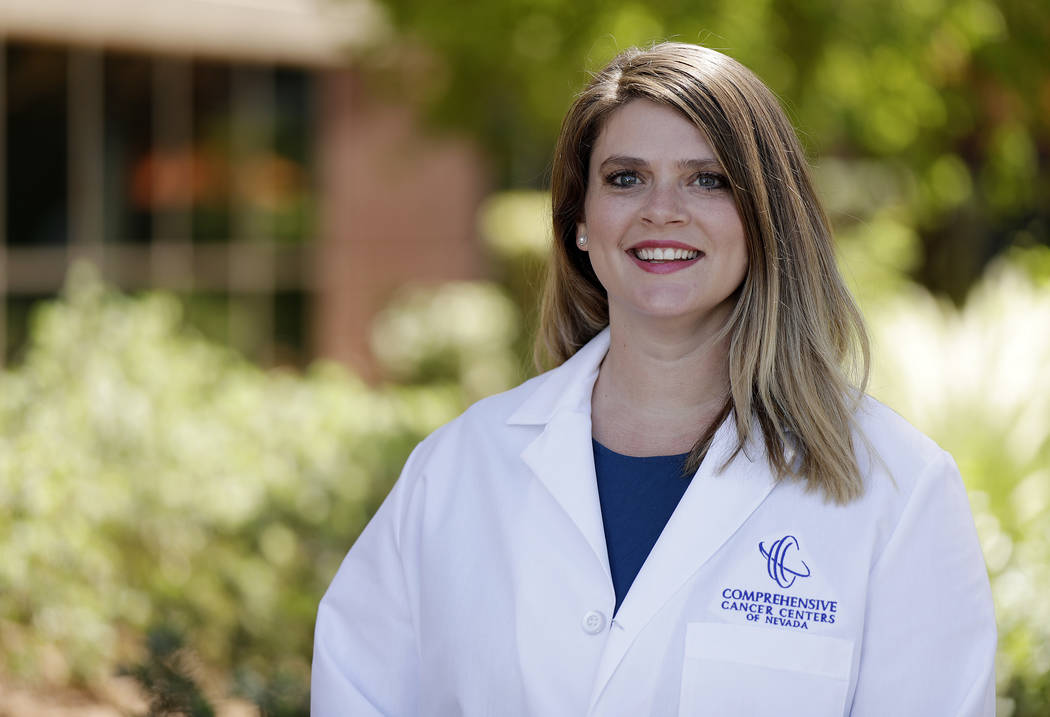CCCN’s new hire specializes in breast surgery
Southern Nevadans will benefit from Dr. Rachel Shirley’s extensive research and training in breast surgery when she begins working at the Comprehensive Cancer Centers of Nevada this month.
“When I was growing up in DeRidder, Louisiana, I always knew I wanted to work in the medical field,” said Shirley, who can’t remember a time when she wasn’t interested in science.
So it was only natural when she began college that she looked toward majoring in the sciences. She attended Baylor University in Waco, Texas, where she majored in biology, before heading on to the University of North Texas’ College of Osteopathic Medicine in Fort Worth. After completing her general surgery residency at Louisiana State University in Shreveport, Shirley was granted a breast surgery fellowship at Grant Medical Center in Columbus, Ohio.
“I was really drawn to breast cancer as a specialty because it’s not just about the surgery,” Shirley said. “When you’re treating someone with this disease, the relationship is really with the patients’ entire family. The team effort aspect really drew me in.”
This extra training that Shirley received at Grand Medial Center means that she is more than well prepared for breast-exclusive practices. The fellowship emphasized short time detection, the utilization of minimally invasive biopsies, patient access to dedicated breast health specialists, review of all newly diagnosed breast cancers weekly and the availability of a weekly free multidisciplinary second opinion clinic.
According to the Grant Medical Center website, “A fellow who completes the program will not only be expertly skilled in the multidisciplinary approach to breast conditions but also in the management of a dedicated breast program.”
Shirley has a personal connection to this disease as well. “My mother-in-law was diagnosed with breast cancer when my husband was 13 years old,” she said. “At the time, his mom was only in her mid-40s and underwent a modified radical mastectomy, because that was the primary method of treatment then. There weren’t so many options.”
For those not familiar with it, a modified radical mastectomy is when the entire breast is removed, including the skin, areola, nipple and most axillary lymph nodes; however, the pectoralis major muscle is spared.
“Today it’s about tailoring the cancer treatment to the individual patient,” Shirley said.
She notes that most breast cancer is not genetically linked; however, BRCA gene testing (a blood test that uses DNA analysis to identify mutations in either one of the two breast cancer susceptibility genes — BRCA1 and BRCA2) is offered to people based on a variety of factors: tumor type, age of patient and family history.
Once someone has been given a breast cancer diagnosis, what steps do they go through?
“They will talk to the surgeon first,” Shirley said. “That’s when they’ll decide on a course of treatment. Sometimes they have surgery first, but sometimes people go through chemotherapy first. It all just depends on the stage and aggressiveness of the tumor(s).”
The treatment protocol also depends on the patients’ age and lifestyle.
After a patient has had surgery and gone through the recommended course of chemotherapy and/or radiation, they will still visit their doctors for several years. “A patient will typically see the surgeon every three to six months for the first five years after surgery, and the same goes for the medical and radiation oncologists, who may follow a patient for life.”
Shirley likes the fact that her Southern Nevada office is very much team-oriented.
“There is such a collaborative effort among the surgeons at the Comprehensive Cancer Centers of Nevada, and they’re all very good physicians in their own right, and I can learn a lot from them. Treatment plans are formulated by the entire team, including radiation oncology, medical oncology, surgery, pathology and radiology.”
She also notes that the physician, surgeon, medical oncologist and radiation oncologist meet with each patient individually.
New technologies in the field keep this physician motivated. “I’m very interested in oncoplastics, which combines the latest plastic surgery techniques with breast surgical oncology. It’s where we, as surgeons, try to place the scar so patients don’t have a constant visual reminder.
“Another surgical advancement technique that really interests me is nipple sparing, where we actually leave the nipple in place and the implants are put in afterward.”
Through a small incision, all of the breast glandular tissue is removed from beneath the overlying skin and nipple. The full breast skin envelope and nipple are left completely intact.
Shirley has a goal of making sure all patients have a thorough understanding of their treatment options and the opportunity to utilize all the resources available to them. She’s also proficient in Spanish and looks forward to incorporating that into her practice at Comprehensive Cancer Centers of Nevada.




























